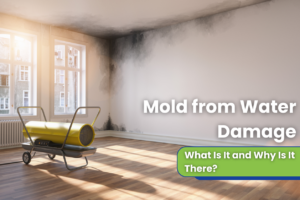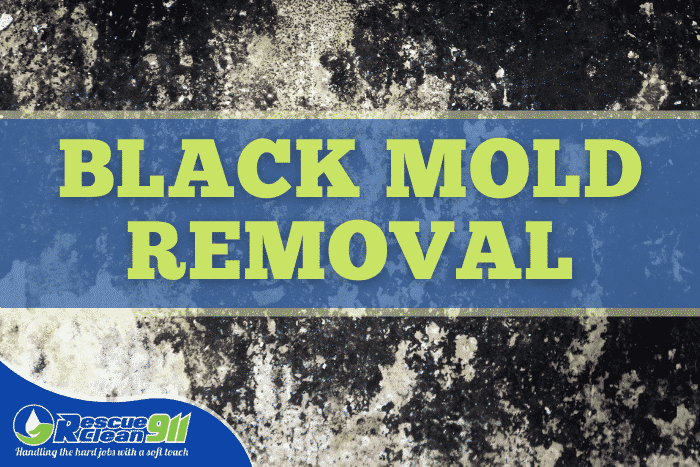
The average shower is the perfect location for mold to grow. Bathrooms are often warm, usually have low light conditions, and have a plentiful supply of moisture from showers and humidity. This means mold can thrive in most showers.
But seeing colorful mold grow along the grout and tiles of your shower is far from relaxing, especially since much of this mold is black, automatically triggering worries that you have a dangerous black mold infestation growing in your shower.
These are some of the potential dangers of shower mold and how you can keep your bathroom clean and healthy.
Is Shower Mold Always Toxic?
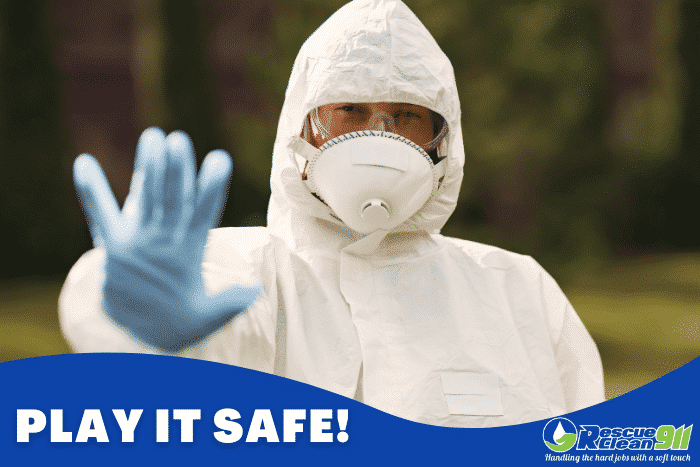 The most alarming factor for many people when they see mold in their shower is that this mold is black in color and their minds automatically jump to fears of notorious black mold that we often hear about on TV and in the news.
The most alarming factor for many people when they see mold in their shower is that this mold is black in color and their minds automatically jump to fears of notorious black mold that we often hear about on TV and in the news.
The mold that grows in showers can be one of many types of mold. It could be black mold, but bathroom mold can also be pink mold, red mold, green mold, and a variety of other colors.
All of these molds can potentially be toxic due to the fact that they may produce mycotoxins. These are what give mold the reputation of being dangerous, and potentially deadly. Consuming mycotoxins can lead to depression, memory problems, and in severe cases, some forms of cancer. Breathing them in can be somewhat harmful, but is far less risky. Mold can cause allergies and other breathing conditions.
While all molds can be toxic, this is highly unlikely for shower mold. The conditions usually are not right for molds to produce mycotoxins, and there are few cases where there is enough exposure to cause long term health problems.
Can You Get Sick From Shower Mold?
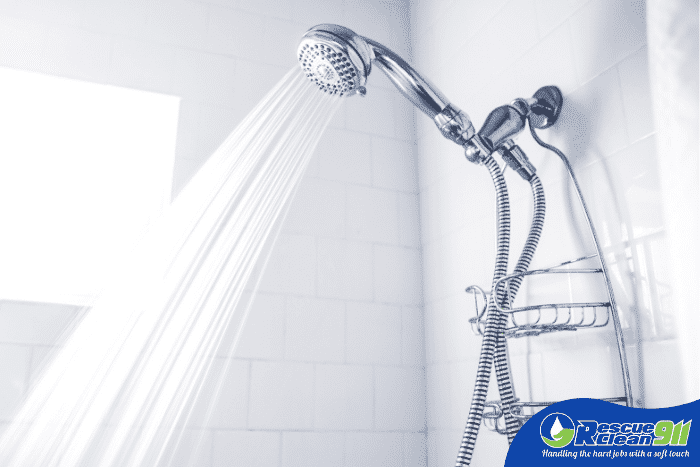
Although toxic mold is not a significant concern for shower mold, there are still health problems that result from allergies to the mold spores. Mold is a leading cause of indoor allergies, and shower mold can be a health risk for this reason.
Allergy symptoms due to being in close proximity to mold spores include:
- Runny Noses
- Headaches
- Drowsiness
- Sneezing
- Congestion, and More
These symptoms are all common side effects of exposure to mold and are likely to get worse if mold in your shower continues to grow. In addition to the unsightly look of shower mold, these symptoms make it important to prevent mold in your bathroom and clean it quickly if it does start to grow.
Finally, as mold grows, it becomes more destructive. The more mold you have in your shower, the more likely it is to start to weaken your drywall, grout, and more. Eliminating mold can have health benefits in addition to saving money on repairs.
How to Prevent Shower Mold
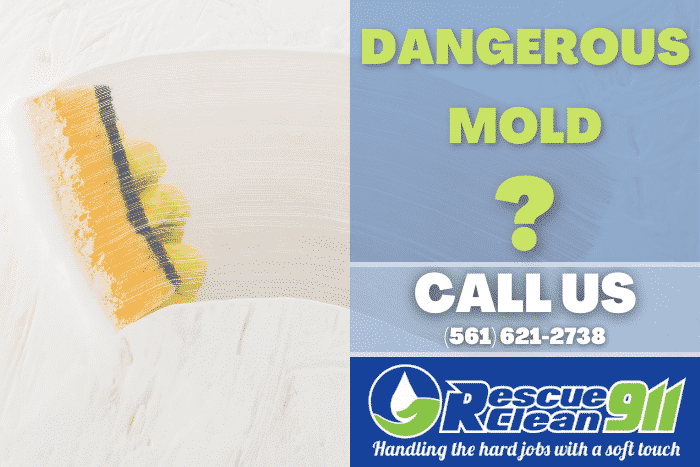
Preventing mold growth requires knowing what causes mold to grow in the first place. Mold is actually a type of fungi that floats through the air in spores. When one of these spores lands on a good growing environment, it will start to produce more spores and cover the surface.
The ideal habitat for mold is one that is:
- Warm – Mold grows best between 60 and 80 degrees Fahrenheit.
- Dark – Direct sunlight will kill mold, although not mildew.
- Has Food – Some natural material is necessary for mold, but this can often be found in the air in a bathroom.
- Moisture – Mold needs near constant moisture to grow.
When you can take steps in your bathroom to remove some of these components, you significantly decrease the risk that shower mold will start to grow.
Keep Your Bathroom Dry & Well-Ventilated
Ventilating your bathroom with a fan or open window prevents excess moisture from building up during a hot shower and dries the room out more quickly afterward. This prevents water from collecting on ceilings, walls, and floors and also keeps the temperature of the room down to make the space less ideal for mold
Use a Shower Curtain
A shower curtain keeps water in the tub and not on the floors. A lot of water on your bathroom floors can seep beneath tile and cause mold to grow underneath without you realizing it. You will want to keep the shower curtain open after bathing, however, to let the interior of the shower dry out.
Clean It Up Right Away
After your shower, remove excess water from doors and shower walls. Also use a towel to wipe up any water that may have splashed onto the floor as soon as you get out of the shower. Stepping out onto a bathmat will also prevent water from puddling on the floor.
Products to Prevent Shower Mold
There are a few products around your bathroom that can also help prevent black mold from growing in your shower. All these are readily available online or local stores and include:
- Shower Rack – Putting all your toiletries on a rack can prevent them from collecting water underneath and growing mold.
- Hooks – Likewise, if you have loofahs or washcloths, hang them on hooks to let them dry completely after a shower.
- Squeegee – A shower squeegee makes it easy to wipe down tile and walls.
- After Shower Sprays – You can spray specially made after shower sprays on to the walls and floor of your shower to prevent mold from growing.
- Dehumidifiers – If your bathroom does not have a fan or windows, a dehumidifier can also help to reduce moisture in the room while you are showering.
Along with the other strategies to keep your bathroom clean and dry, investing in a few of these products provides additional protection against harmful mold in your bathroom.
Call The Professionals Today!
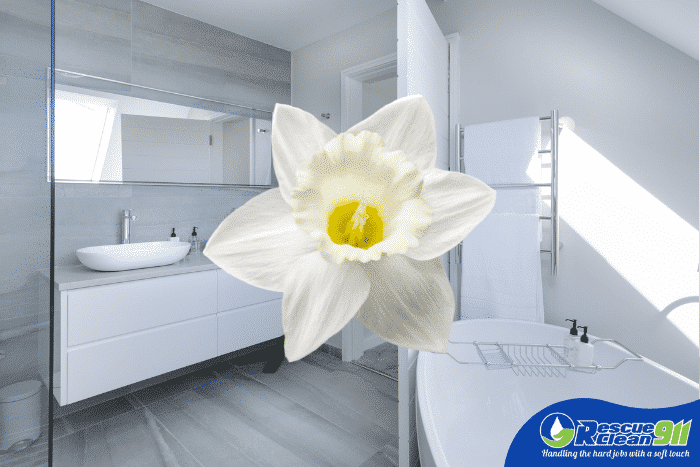
If there is a large amount of mold in your bathroom, mold is the result of flood or a leak, or you are at all unsure about mold, it is a better option to leave treatment to a professional. This guarantees that you will avoid any risks associated with mold removal.
Shower mold is a common occurrence, and in small amounts it is typically harmless. But the more severe the mold, the more dangerous it may be.
The team at Rescue Clean 911 provides mold remediation in South Florida. We identify the cause of mold growth in your bathroom, clean all affected surfaces, and help you make changes that will prevent mold from growing back in your bathroom. Call Rescue Clean 911 to get started with fast and effective removal of dangerous, black shower mold.
Frequently Asked Questions
Is shower mold black mold?
Mold growing in showers can be Stachybotrys chartarum, the mold that is most commonly known as black mold. This mold is green or black in color. But shower mold can also belong to several other mold species, including others that appear black. All of these have health risks, so one is not necessarily safer than another.
How do I know if mold is black mold?
The only way to tell if mold is specifically black mold is to take it to a lab for testing. But since all mold has the potential to be toxic, it is not necessary to determine which type of mold is growing in your shower. Instead, it is best to just treat all mold as if it is potentially dangerous and to treat it immediately.
Can I remove black mold from the shower myself?
You can remove small sections of mold on tile or grout. There are several specific mold cleaners on the market, but simply mixing one part bleach with two parts water will also effectively kill mold. Apply this mixture to any areas where you see mold growing and allow it to sit for 10 minutes. A bristled brush or a toothbrush for small areas can be used after 10 minutes to help rub mold away.

